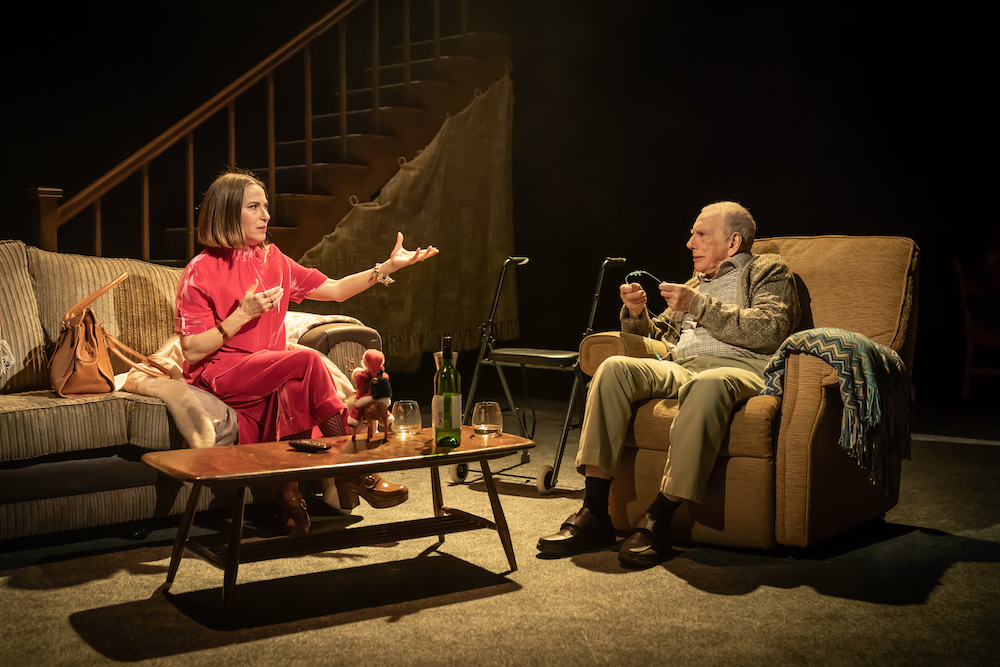Pain is, at one and the same time, something to avoid, and also something you can use. Kahlil Gibran, the Lebanese-American mystical author of the 1923 best-seller The Prophet, concludes that, despite suffering, “all is well”, but how true is that? In his award-winning play, which premiered in Boston in 2011, American playwright Stephen Karam examines the issues in a thoroughly original, brilliantly constructed and thematically compelling way.
Now getting its belated European premiere at the Hampstead Theatre, Sons of the Prophet is an enthralling experience, both intellectually and emotionally. Its central character is American-born Joseph Douaihy, a twentysomething gay Maronite Christian in rural Pennsylvania, who finds himself responsible for his family after his father is killed in car accident when a high-school prank goes wrong. But a mystery illness has finished his athletics career, and compromises his ability to care for his teenage brother Charles and their Uncle Bill, who has health problems of his own. Joseph’s new job with book publisher Gloria, an unstable rich widow from Manhattan, has its own tensions: she wants him to write a memoir about a distant family connection to Gibran, who preached spiritual bliss through suffering. In return he gets much-needed health insurance.
Karam tantalisingly adds to Joseph’s problems by introducing two other characters: first there’s Vin, a mixed race high-school football star, who was responsible for the prank that killed Joseph’s father, but who now wants to make amends (in the hope of being able to delay his punishment and let him play in some matches which will clinch sponsorship of his further education). Second, there’s Timothy, a handsome and privileged gay white journalist, who wants to report on the Douaihy’s family story. While Joseph is attracted to Timothy, Charles hits it off with Vin.  The theme of pain is explored not only through Joseph’s suffering, but also with old Uncle Bill, who sees trials and tribulations in a religious light, a sickly glow that illuminates the fact that the Douaihys tend to die tragically, “like the Kennedys but without the sex appeal”. In the family home there’s an icon of St Rafka, Lebanon’s patron saint, whose blindness argues that suffering must be borne stoically (it gets you closer to God, too). By contrast, Gloria, a larger-than-life personality who has lost her husband to suicide, shows how some people exploit their own pain to dominate others.
The theme of pain is explored not only through Joseph’s suffering, but also with old Uncle Bill, who sees trials and tribulations in a religious light, a sickly glow that illuminates the fact that the Douaihys tend to die tragically, “like the Kennedys but without the sex appeal”. In the family home there’s an icon of St Rafka, Lebanon’s patron saint, whose blindness argues that suffering must be borne stoically (it gets you closer to God, too). By contrast, Gloria, a larger-than-life personality who has lost her husband to suicide, shows how some people exploit their own pain to dominate others.
So Karam questions the value of different forms of suffering. For example, Joseph’s condition gets worse the more he tries to help his family, and to deal with America’s labyrinthine health insurance system, while Vin’s value to society (as a rising football star) means that his well-deserved punishment for causing a needless death can be delayed and mitigated. If Gloria can cash in on her own depression, why would anyone trust her with their family history? Or with getting a book deal for Charlie’s game about every country on the world map having a memorable shape that is reminiscent of something else: Lebanon looks like a man’s face, in pain and screaming.
Karam structures the play, whose action spans summer to spring 2006-2007, in six scenes that follow The Prophet in their titles, and his writing is both humane and often bleakly hilarious. He has fun with the small towns of Eastern Pennsylvania, which are called things like Nazareth, Bethlehem and Lebanon (another Lebanon in Kansas is the geographic centre of the USA!), and both celebrates and satirises the migrant experience of Maronites. As the newer generations struggle to free themselves from religion, we are also reminded of how faith can be a great comfort. At one point, Timothy gives a stinging literary criticism of Gibran, while acknowledging his usefulness to those in distress.
Bijan Sheibani’s aptly restrained production, designed by Samal Blak and enriched by a great soundtrack, is faithful to Karam’s excellently intelligent and perceptive text in its fine balance between excruciating pain and ironic comedy, and the ending is suitably moving with its beautiful glimmer of hope. Irfan Shamji (Joseph) and Eric Sirakian (Charles) convincingly play the neatly contrasting brothers, while Juliet Cowan (Gloria) and Raad Rawi (Bill, pictured above with Cowan) give their powerful characters more humanity than caricature. Jack Holden (Timothy) and Raphael Akuwudike (Vin) are good in support. A ray of optimism in a horrible world.















Add comment